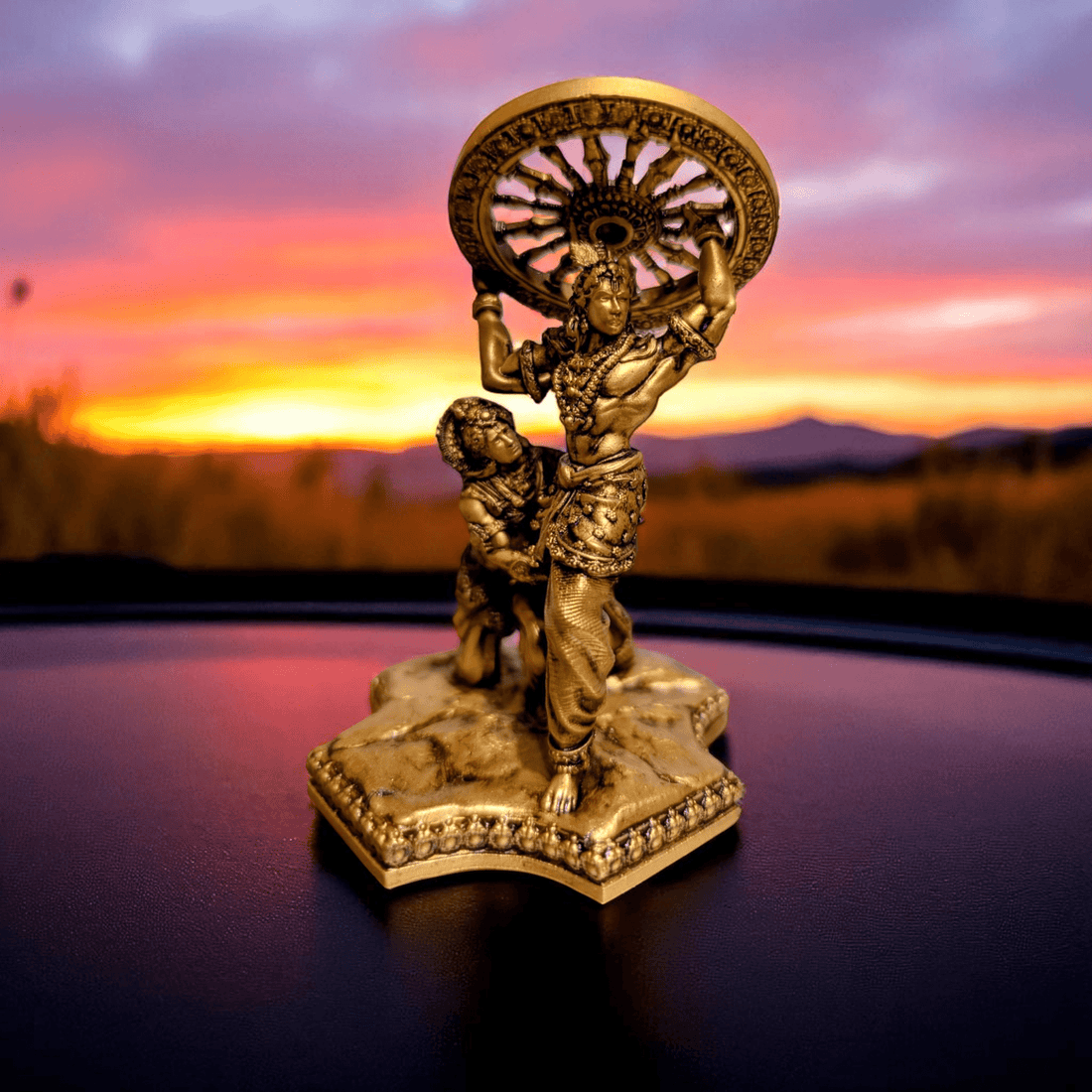
When God Lifted the Wheel: Krishna, Arjuna, and the Breaking of a Vow
Share
A Moment That Shook Dharma
On the battlefield of Kurukshetra, amidst the cries of war and the clash of dharma and adharma, there came a moment so fierce, so profound, that it transcended the rules of the game itself.
Lord Krishna, the charioteer of Arjuna, broke his own vow of not picking up weapons in the war. He lifted a broken chariot wheel and rushed toward Bheeshma Pitamah, eyes blazing with divine fury. This was no ordinary act of aggression. This was a moment where divine love, duty, and the deeper law of the universe collided into one overwhelming decision.
What Was Krishna’s Vow?
Before the war began, Krishna had declared:
“I will not pick up a weapon. I shall not fight.”
He offered himself to the Pandavas as a non-combatant—only a guide, a charioteer. That was his promise. A god’s promise. Unshakable… until dharma itself demanded otherwise.
Why Did Krishna Break His Vow?
Because Arjuna — the mighty warrior and Krishna’s dearest friend — hesitated. He faltered.
And because Bheeshma, the great patriarch, had taken a vow of his own:
"I will fight so fiercely that Krishna himself will be forced to pick up a weapon to stop me."
In that moment of crisis, Krishna saw the danger—not just to Arjuna, but to the larger cause of dharma. He chose his devotee's protection over his own ego, his own words.
This was not a failure of will, but the supreme victory of love and righteousness over pride.
The Chariot Wheel: A Symbol of Divine Intervention
Krishna didn’t lift a sword or a mace.
He lifted a broken wheel—a discarded, forgotten fragment of war machinery—and turned it into a divine weapon.
In that image, we see a god not bound by prestige, not tied to vows, but anchored in love. His message was clear:
"No promise, no rule, no ego stands above the need to protect righteousness and those who stand for it."
The Lessons for Our Lives
1.Love Breaks All Limits
When someone you love is in danger—physically, emotionally, or spiritually—you don’t stay passive. You act, even if it means breaking your own rigid codes.
2. Dharma is Higher Than Ego
Dharma is not about sticking blindly to promises. It is about doing what is right, in the right moment, for the right cause.
3. Let Go of False Vows
How often do we bind ourselves with vows made in anger, grief, or pride? Krishna reminds us: it is okay to break promises that no longer serve a higher purpose.
4. God is Not Passive
Krishna wasn’t just a philosopher or a detached observer. He intervened when it mattered. So will the divine in your life—if your cause is true, your heart is surrendered.
What This Scene Teaches Us
🔱 God is Not Bound by Ego
Krishna didn’t act from pride. He acted from love. Even the divine can become fierce when dharma is threatened and the devotee is in danger.
🙏 The Power of Bhakti (Devotion)
Arjuna’s surrender, not his weapons, stopped Krishna. True bhakti melts even the fiercest wrath of the Divine.
🕉 Vows Are Sacred—But Dharma is Supreme
Krishna was willing to break His own vow, but not let injustice win. This is the ultimate message: Truth is above all – even above one’s personal code.
A Modern Reflection
In your personal battles—when you feel overwhelmed, cornered, or betrayed—remember this scene.
Even God lifts the wheel when truth is threatened.
And perhaps, within your own soul, there is a Krishna ready to rise, ready to shatter ego, and ready to act with fierce compassion.
Conclusion: The Wheel Still Turns
That wheel Krishna lifted still spins in the cosmos.
It is the Chakra of Dharma, turning constantly to uphold justice, protect the pure-hearted, and awaken the sleeping warrior within us all.
May you never forget that when the world stands against you, and your purpose is true, even the Creator may break His own rules to walk beside you.
